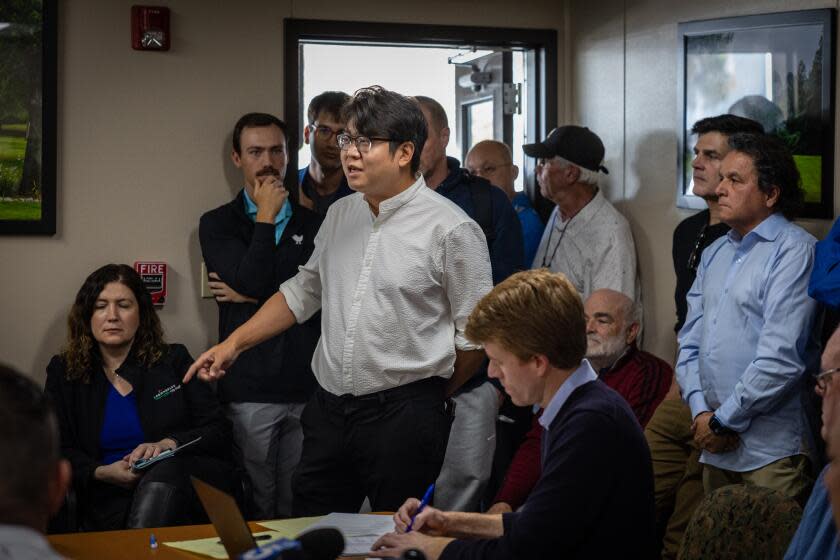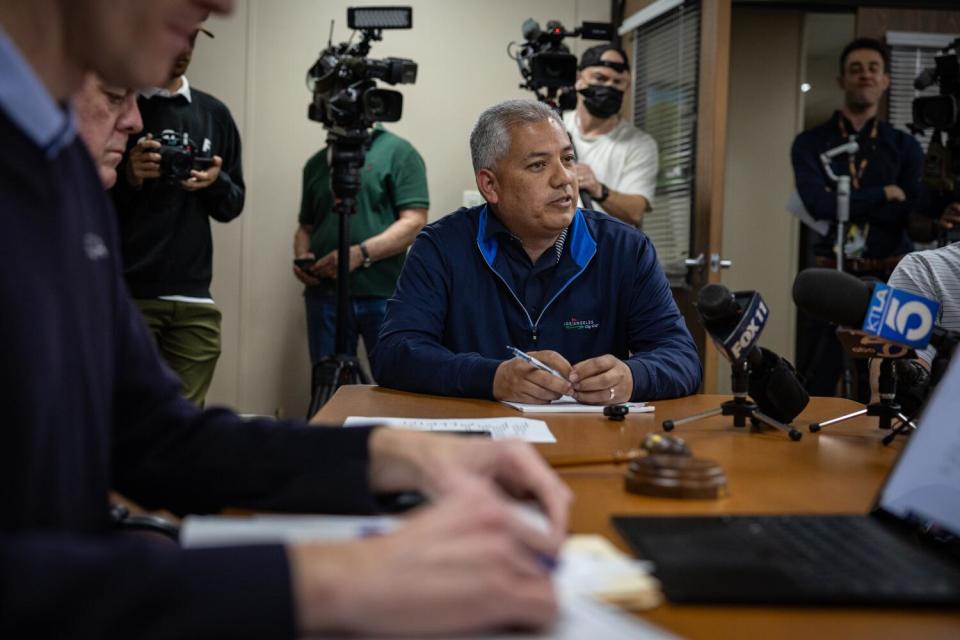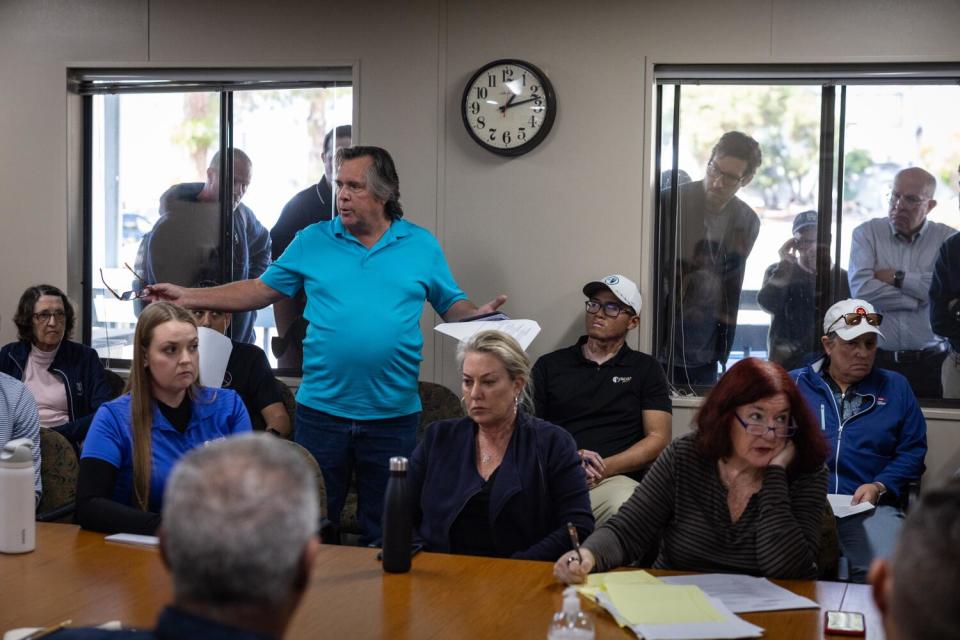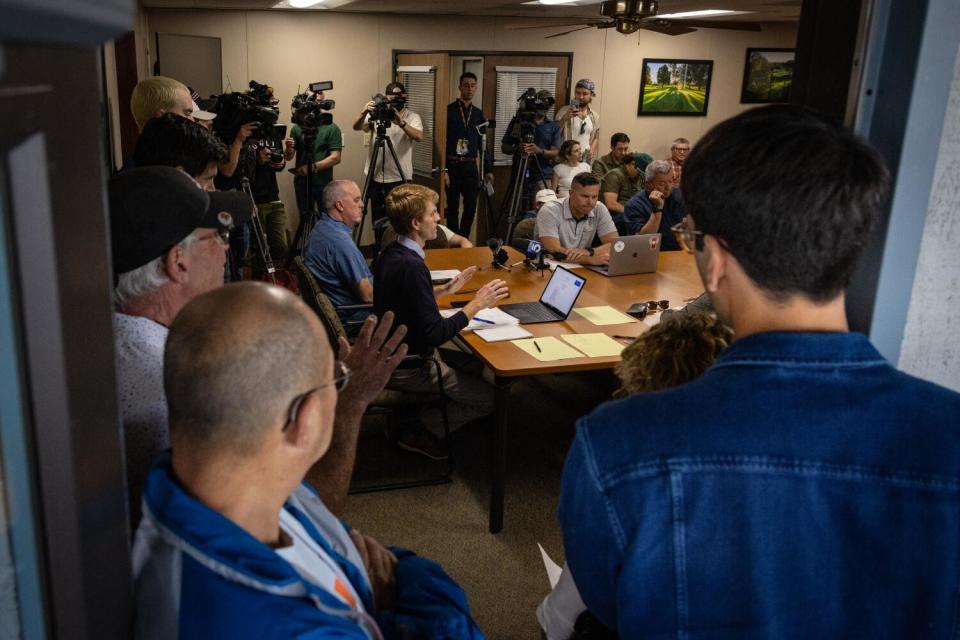'I am angry': Golfers demand that L.A. officials stop booming black market in tee times

Golfers and other community members expressed their outrage Monday and demanded answers from city officials about a booming black market that has co-opted scarce tee times at Los Angeles city golf courses.
The lone city official at the meeting of the all-volunteer golf advisory committee offered only brief remarks and did not answer questions from speakers about why the city has not stopped the practice of brokers buying up the tee times and charging up to $40 as a booking fee.
"This is an unconscionable breach of the public trust. We are here to serve the public, and a very small segment of the public is being served, and I am angry about it," said Karen Thornton, chair of the Griffith Park Advisory Board. Two city-run golf courses, Wilson and Harding, are part of Griffith Park.
Thornton said she and her advisory board colleagues had previously urged the head of the city's golf program, Rick Reinschmidt, to fix the issue.
"We haven't seen any substantive change whatsoever," Thornton said. "We're going to fight alongside golfers until this gets solved," bringing an eruption of applause from the crowd.

Meetings of the golf advisory committee, which is part of the L.A. Department of Recreation and Parks, are normally staid affairs. But on Monday, people packed a small conference room in a gray bungalow by the L.A. River, with many standing and some overflowing out the door.
Reinschmidt was not present.
Chuck Ruiz, a member of the city golf division management staff, said that regarding "the reselling of tee times, the department is well aware of this issue, and at this time, we are looking into this issue with our booking engine vendor."
The findings of an ongoing investigation, Ruiz said, will be shared with the city's Board of Recreation and Park, whose commissioners are appointed by Mayor Karen Bass.
Steve Brown, a golfer on L.A.'s municipal courses since 1976, urged officials to "dig down deep" and even arrest and prosecute those who may be committing crimes.
"I have nothing against my Korean brethren who love to golf — it's just not right for everybody else," Brown said. "This is a huge problem that has to be solved."

Within the Korean golf community, it’s common knowledge that brokers use senior memberships to book morning and early afternoon tee times and resell them, according to several interviews by The Times.
It is impossible to know exactly how many tee times brokers are scooping up or how much the Korean brokers contribute to the dearth of golfing slots.
At city courses, slots open up at 6 a.m. for golfing nine days ahead. And every morning, in a matter of seconds, the reservations disappear on the city’s online booking platform, GolfNow. Golfers say that without using a broker, they get tee times primarily through last-minute cancellations or a waitlist, where they must stand by in person from five minutes to several hours. Sometimes the list doesn’t get tapped at all.
City courses in Griffith Park, Rancho Park and Hansen Dam offer unrivaled convenience and affordability, typically charging around $35 per person, higher on weekends and holidays. The fee is the same for nonresidents.
Joseph Lee, president of SoCal Dream Golf Club and an active member of L.A.'s Korean community, condemned the brokers and vowed to expose how they are monetizing a public good.
"We're chasing them til the end, and we'll keep you updated," Lee said to cheers at the meeting.
Nevertheless, longtime golf advisory committee member Anne Matthews questioned whether the existence of brokers has been proven.
"Is there evidence that these people exist and that this is happening?" Matthews said.
Dozens replied, "Yes."
"The demand for golf is overwhelming," Matthews continued. "So this problem will persist, even if we get rid of — which is absolutely the right thing to do — these brokers."

Several committee members agreed that changes are needed to the tee time system. They expressed interest in measures to guard against brokering, such as randomly releasing canceled tee times, implementing a lottery or requiring prepayment to secure a tee time online.
"We want the system to be available to anyone in Los Angeles who wants to play," said Kevin Fitzgerald, chair of the golf advisory committee. "I'm convinced that the golf division, I'm convinced that the third-party vendor wants to do everything that it can to protect the system."
Nick Luna, a resident of Boyle Heights, likened the private brokering of tee times to former L.A. city Councilman Jose Huizar accepting bribes from developers.
Huizar is one of three City Council members convicted of federal corruption charges in recent years.
"Unfortunately, I've seen corruption firsthand," said Luna, noting he lived in Huizar's district and went to a ribbon cutting hosted by the disgraced ex-councilman. Luna said that any city employees involved in the brokering should suffer consequences, including losing their jobs.
Golfers descended on the golf advisory committee meeting after golfing influencer Dave Fink used his Instagram page with 200,000 followers to bring attention to the brokering. Fink addressed the city officials on Monday and explained why he was so outraged.
"The brokers have essentially privatized public golf. And it's been heartbreaking for all of us regular people who depend on these public parks to play this beautiful game," Fink said at the meeting. "I used my online presence to alert others of this misdeed. And I'm glad that through the power of community, we've been able to enact some change already."

Fink learned about the brokers from cinematographer and fellow golfer Josh Hill, who interviewed players at Griffith Park one weekend to see how they were scoring precious tee times.
"I finally found one person who was willing to talk to me and let me know that they used a broker to get the time. And that was the only way to get a time, basically, on a Saturday and Sunday. And I got pretty pissed off," Hill said at the meeting. "We have to figure out a way to put a plan in place that actually solves the problem."
The golf advisory committee took no formal action Monday but planned to call for a special meeting, in a larger venue, to discuss the scope of the problem and potential solutions.
Community members asked that a representative from GolfNow — a subsidiary of NBC Sports Next — be present to answer questions at the next meeting.
This story originally appeared in Los Angeles Times.


